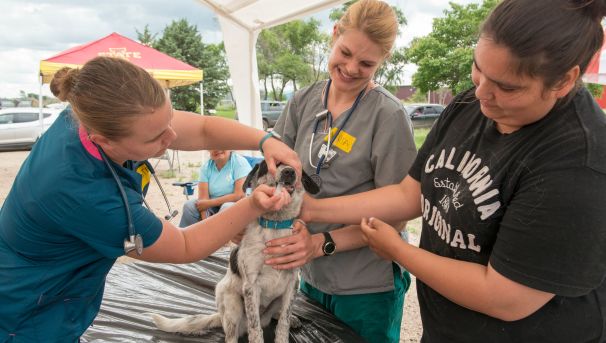Thank You!
Dear Generous Donors,
On behalf of the veterinarians, veterinary students, veterinary technicians, and numerous volunteers, we would like to thank you for your financial contributions to the Crow Creek Reservation Service Project.
Your donations helped provide preventative veterinary care to 345 animals, including 253 dogs, 90 cats, and 1 rabbit. Throughout the 3 day service project, the animals received vaccinations against infectious diseases, physical wellness examinations, and medications to prevent heartworm infection and flea, tick, and internal parasite infestations. Additional products that we were able to provide to patients in need included antibiotics, pain medications, ear cleaning medications, Purina cat and dog food, and treats.
Your donations also helped provide surgery materials including suture, blades, gloves, sterile scrub brushes, drapes and more, to 95 dogs and cats that received surgery. These animals received either a spay or a castration if owners opted for alteration surgery.
The equine portion of the project benefited greatly from your generosity as well. We were able to perform physical examinations, vaccinations, and de-worm 108 horses during the clinic. Ten horses were castrated and 8 horses received dental care during the equine surgery portion of the clinic. In addition to the equine work done in Fort Thompson, a team of volunteers traveled to Mission, South Dakota to offer veterinary services to horse owners on the Rosebud Reservation.
This service project was a great opportunity, not only for those who brought their dogs, cats, and horses, but also for the veterinary students who gained hands-on experience working under the guidance of skilled clinicians. Specifically, veterinary students were able to improve their physical examination skills, blood collection, subcutaneous and intramuscular injection techniques, proper and safe animal restraint, surgical skills, and client communications. Since this program began, there has been an increase in the overall health of the animals owned by the Crow Creek Reservation members. One of the Tribal Members thanked us and remarked “my horse herd is much healthier because of you guys.”
The Crow Creek Service Project is part of a two week fourth year veterinary student rotation called Clinical Practice in Diverse Communities. The students participating in the rotation spent time learning about the history and culture of the Crow Creek Tribe before they traveled to South Dakota. During the service trip, Tribal members devoted time to speaking to students about their heritage, the importance of animals in their cultural history, and the challenges that their community has faced in the past and in the present.
This service project would not be possible without your generosity and your contributions are much appreciated by volunteers and the residents of the Crow Creek Reservation.
With gratitude,
Members of the Crow Creek Reservation service project
One More Day!
Thanks everyone for your amazing donations to our project! We are excited and thankful to have you as a part of our team! In two weeks we will be driving to Fort Thompson to meet with Tribal members and to provide veterinary services to dog, cat, and horse owners. These last two weeks before we leave are a critical time in project preparations. We have many different teams who are working to make this trip possible:
- ISU faculty and staff members are currently preparing and packing surgery equipment and ordering supplies and medications to prepare for the trip.
- Tribal members in Fort Thompson are helping to arrange lodging accommodations for our team, gather tables and oxygen tanks, and to prepare our small animal and equine clinic areas.
- Students will be checking our equipment inventory and organizing it so that the clinics can be assembled as efficiently as possible.
- A team of 4H members and recent graduates are researching and gathering teaching materials for the Kid’s Vet Tent.
- Team leaders will be meeting with students and volunteers to prepare them for the trip.
- Our team cook is preparing a menu and gathering supplies for the trip.
In addition to all of these hard-working teams, we have alumni and volunteers flying in from Michigan, Illinois, New York, Colorado and North Carolina to join us in South Dakota. The project is an orchestration between many people who all care about providing quality veterinary car.
If you haven’t already, please consider sharing our FundISU project to your various social media platforms to help us reach even more potential donors. This project runs on donations, and we have only one day left to fundraise.
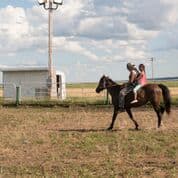
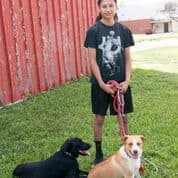
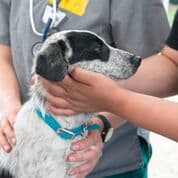
Small Animal Preventative Care
Welcome to our second update! We are still at 30% of our funding progress with 8 days left. If you haven’t shared our FundISU page with your friends and family, please do! We appreciate all who have donated so far and those who have shared our page on their social media. In this update we wanted to discuss what type of preventative care we provide the small animal patients that attend our clinic.
Dogs in Preventative Care
Every dog that is presented to the preventative care clinic is weighed at the start of the exam. Getting an accurate weight is important for determining the amount of medication each patient will need including deworming medication, heartworm preventative, flea/tick preventative, and any additional medications if needed based on the physical exam. A history is collected from the owner regarding the pet and any issues that are mentioned are addressed if possible. If the concern is out of the scope of what can be provided at the preventative clinic it is recommended that the patient see a local veterinarian for follow-up. A full physical exam is performed from head to tail looking at every inch of the dog to look for any issues such as fleas, ticks, wounds, ear infections, eye infections, etc. and treatment is provided if needed. Blood is drawn for a 4Dx test which tests for Heartworm Disease and 3 tick borne diseases -- Lyme, Ehrlichia, and Anaplasma. If any of these tests are positive the disease is explained to the owner and treatment is started. Positive Heartworm Disease will need follow up with a local veterinarian to continue treatment. A fecal sample can be run to look for any intestinal parasites if the owner is noting any diarrhea. Distemper (DHPP) and Rabies vaccinations are administered to each patient. Liquid deworming medication is given to treat some of the most common intestinal parasites that could be present. Each dog is either given a ProHeart6 injection that supplies heartworm prevention for 6 months or is sent home with monthly heartworm preventative. Each dog is also sent home with several months’ worth of flea/tick preventative. If supplies are available, we try to send home a collar and leash with each patient that does not have one. We also discuss spaying and neutering and try to sign them up for a surgical appointment if they are interested in the procedure.
Cats in Preventative Care
Every cat that is presented to the preventative care clinic is weighed at the start of the exam. If there are lots of dogs around or if the cat appears nervous at the start of the exam we will take them to a smaller room to make them more comfortable. Getting an accurate weight is important for determining the amount of medication each patient will need including deworming medication, flea/tick preventative, and any additional medications if needed. A history is collected from the owner regarding the pet and any concerns that are mentioned are addressed if possible. If the issue is out of the scope of what can be provided by the preventative care clinic it is recommended that the patient see a local veterinarian for follow-up. A full physical exam is performed from head to tail looking at every inch of the cat to look for any issues such as fleas, ticks, wounds, ear infections, eye infections, etc. and treatment is provided if needed. Blood is drawn for an FeLV/FIV test which tests for Feline Leukemia Virus and Feline Immunodeficiency Virus. If any of these tests are positive the disease is explained to the owner. A fecal sample can be run to look for any intestinal parasites if the owner is noting any diarrhea. Distemper (FVCRP) and Rabies vaccinations are administered to each patient. Liquid deworming medication is given to treat some of the most common intestinal parasites that could be present. Each cat is sent home with several months’ worth of flea/tick preventative. If supplies are available, we try to send home a cardboard cat carrier with each patient that does not have one. We also discuss spaying and neutering and try to sign them up for a surgical appointment if they are interested in the procedure.
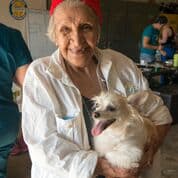
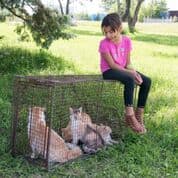
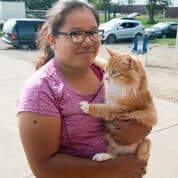
Setup
Welcome to our first update! First, thank you to all our donors so far, we have raised 30% of our funds with 14 days left in our fund-raising campaign. In our first update we wanted to discuss what it takes to get to Fort Thompson and how we transform the Fire Hall into a walk-in clinic.
We could not setup this clinic without the help of local leaders and reservation members. It takes everyone to pull this together. For example, Indian Health Services provides tables for us to use throughout the clinic. Also, the Fort Thompson Fire Department allows us to use their 4-bay garage for the small animal clinic. In the first bay we have a receiving area, lab, and pharmacy area. In the next two bays we setup an area for exams and vaccinations. If the weather is nice, we will also provide those exams and vaccinations outside under a canopy that a donor generously provided last year. In the last bay we setup our surgery area. We also use the Fire Department’s office as a surgery recovery area because it has air conditioning.
We setup our equine clinic at the Fort Thompson rodeo grounds. We work out of one of our Iowa State Equine Field Service Trucks and we use an enclosed hauling trailer to store our supplies and to prepare medications.
Last year was the first year that we had the Kid’s Vet Tent. This tent is devoted to educational activities related to veterinary medicine. Children can spend time with volunteers and veterinary students, drawing and coloring, learning how to use a stethoscope and other veterinary tools, learning about parasites which are important in veterinary medicine, and looking at skeletal specimens.
Below is a video of our small animal clinic setup...in 60 seconds along with pictures of the kids tent, rodeo grounds and small animal clinic.
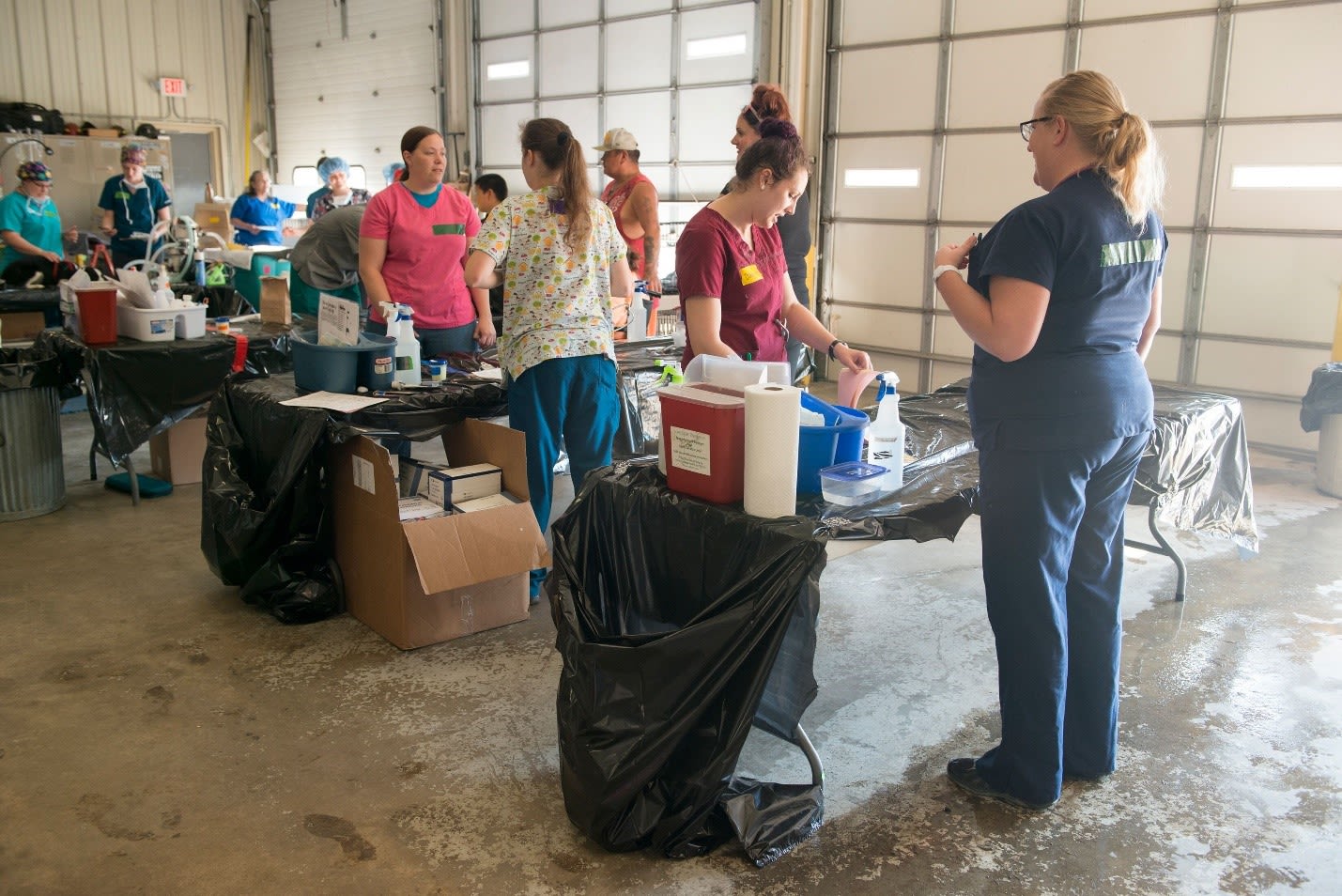
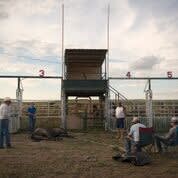
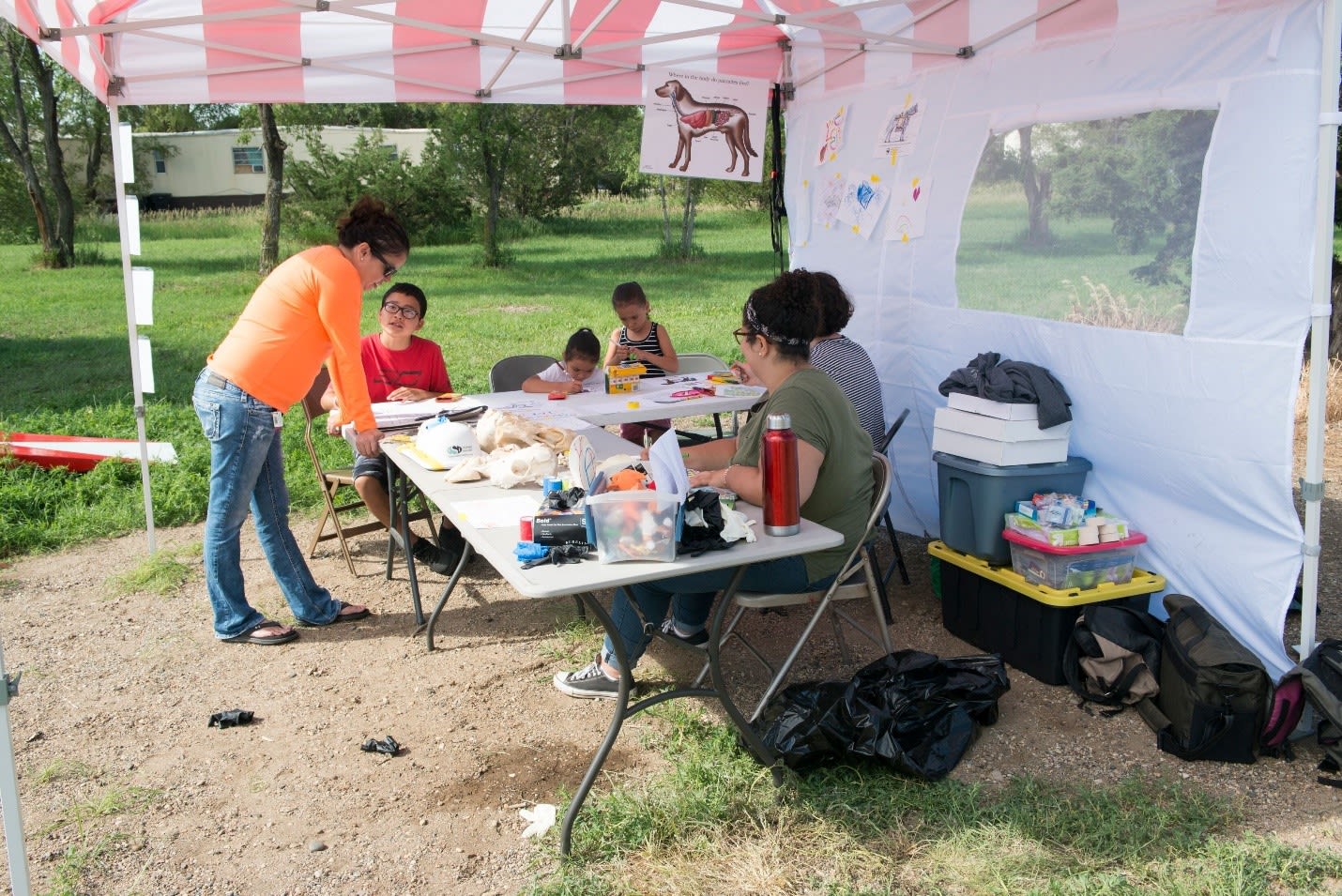
$15
Collar and Leash
Your $15 donation will help provide a collar and leash for a dog or cat during our clinic.
$30
Topical Flea and Tick Product
Your $30 dollar donation will help provide topical flea and tick treatment for a dog or cat during our clinic.
$50
Colt Wellness Exam and Surgery
Your $50 donation will help provide a colt wellness exam and surgery during our clinic.
$100
Cat or Dog Exam and Surgery
Your $100 donation will help provide a wellness exam and surgery to cat or dog during our clinic.
$250
Scale
Your $250 donation will help us purchase a new scale to weigh small animal patients during our clinic.
$500
Surgery Table
Your $500 donation will help us purchase a new surgery table for small animal surgeries during our clinic.

